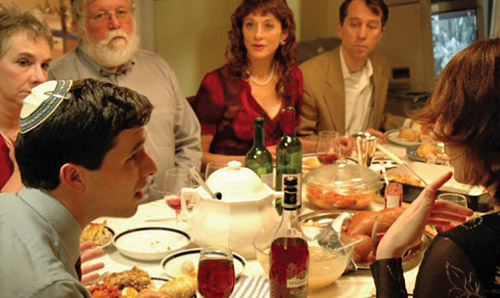Having practiced law for 43 years and served as a rabbi for 10, I’ve observed an enduring theme in both professions. People bare their souls to me and share concerns about other family members. I’ve learned of dark secrets and distrubing behaviors all seeming to unravel the myth of the happy Jewish family. My experience suggests that truly happy families are less common than I once believed. But there are lessons we can learn to overcome the challenges.
Jewish Families in the Torah
Wounded families, it seems, is woven into the very origins of Jewish tradition—beginning with Isaac and Rebekah and their sons, Jacob and Esau, as recounted in the Torah portion Toldot—meaning “generations.” A narrative of contention and strife continues into modern times, recently on display in the streaming program “Nobody Wants This.” But that doesn’t mean all families are doomed to disruption. Those that are wounded can learn to heal from our history.
In the Torah, accounts of family life are fraught. In Toldot, Esau, the firstborn, is entitled to both the birthright and the blessing. Yet his impulsive nature and lack of insight render him unfit to lead. Jacob, more calculating and clever, manipulates Esau into selling his birthright. With their mother’s help, he then deceives Isaac into bestowing the blessing meant for the firstborn. Isaac, seemingly blind to the family’s dysfunction, is duped. The resulting discord drives Jacob into exile. While the family fractures, the mantle of leadership nonetheless passes through Jacob —shaping the future of the Jewish people.
Jewish Families in Movies
Stories of disruption in families is hardly unique within Jewish tradition or popular culture. Consider Tevye and Golde in Fiddler on the Roof, who bemoan a daughter marrying a non-Jewish husband. Steven Spielberg’s The Fabelmans offers a more modern portrait of parental fracture and divorce.
Nobody Wants This
Jewish families on television are frequently depicted with an undercurrent of dysfunction—small indiscretions, microaggressions, and misunderstandings. More recently, the series “Nobody Wants This” explores the relationship between a single male rabbi and an effervescent, agnostic femail podcaster. In the first season, the rabbi’s Jewish mother, sister, and ex-girlfriend were reduced to caricatures as male-obsessed and manipulative. Rabbi Sharon Brous, of IKAR in Los Angeles, called it cringe-worthy.
Upon reviewing “Nobody Wants This,” writer Jessica Radloff observed that the Jewish women “come off as controlling, marriage-hungry women who want to plan dinner parties and alienate anyone who doesn’t share those same dreams.” Meanwhile, the men are more of a mixture. The Rabbi is portrayed as an ideal partners, willing to sacrifice for love, while his brother is hen-pecked and faithless. These depictions vacillate between the wretched and the romantic. And they harken back to the Torah. Think again of Isaac, the passive father, and Rebekah the crafty mother.
In season two, the Jewish women soften, become more welcoming, and portray a shift in understanding. Rabbi Sharon Brous consulted with the writers and gave credit for their efforts. The story line gives hope for a happy ending. Yet, the family remains frought with challenges.

Admiration for the Jewish Family
The Jewish family, and especially Jewish women, should not be universally defined by negative depictions. In fact, the Jewish family remains the envy of many outside observers. People admire our strong emphasis on education and advocacy for our children. Jewish patients are known to seek the highest standard of health care. Jewish families have a reputation for responsibility, intelligence, and success.
These virtues derive from the Torah’s emphasis on learning, diligence, and reverence for life. The family stories in Torah, are cautionary tales. The moral instruction is the real story.
Happy Families Are Not the Goal
Jewish families are not fundamentally different from other families in matters of attachment, satisfaction, or ambition. We all long for a harmonious life, meaningful relationships, and a better future for our children. What distinguishes the Jewish family’s background may be found in the Torah’s candid portrayal of their imperfections—a recognition that holiness and discord can coexist within the same household. Modern portrayals, absent the background of the Torah, result in “cringeworthy” characterizations.
Maybe the “happy Jewish family” was never the right goal at all. Rather, the Torah’s enduring stories show us, sometimes through failure, to strive toward greater honesty, compassion, and connection within our own families. We can flip the script and can say “Everybody Wants This!”
Rabbi Evan J. Krame
If this reflection resonates with you, consider sharing it on social media—or simply take a moment to reflect on how you can create a better community.





